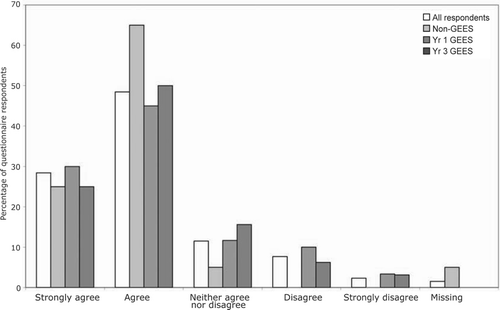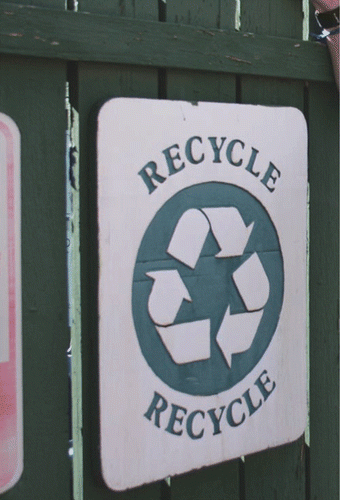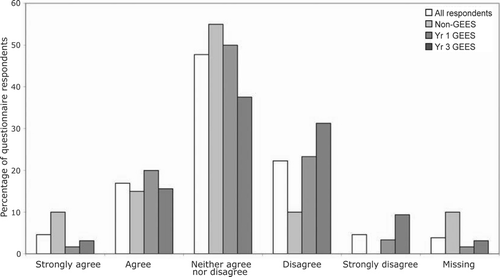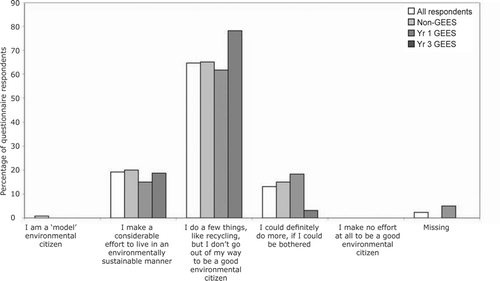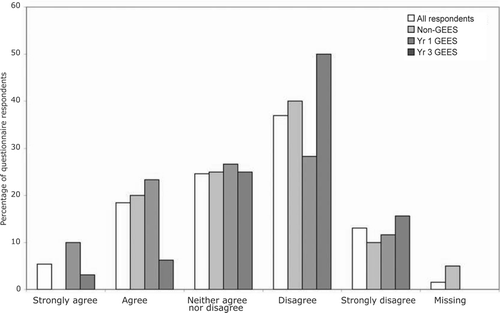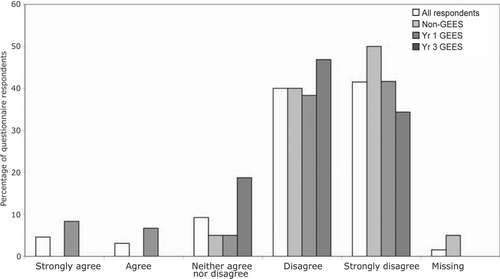Abstract
This paper reports on the findings from a GEES-funded project carried out at one UK Higher Education Institution comparing the environmental attitudes and behaviour of Geography, Earth and Environmental Sciences (GEES) students and those students not studying these overtly ‘environmental’ subjects, and explores some of the motivations for, and barriers to, students becoming ‘good environmental citizens’. The results of questionnaire surveys and focus groups carried out with students as part of this project suggest that students often struggle to put their environmental principles into practice. Although GEES students see environmental matters as the most important issues in the world today, they may be less likely to take part in environmental practices than students studying non-GEES subjects.
Introduction
‘Environmental citizenship’ recognizes the link between our future and our care for the environment, and embodies a sense of responsibility leading to action on behalf of the environment (environmental behaviour or practices). These notions are integral to the concept and goal of sustainable development. The potentially important role of Higher Education in education for sustainable development (ESD) has been showcased by CitationHEFCE’s report ‘Sustainable development in higher education’ (2005/28). This report presents a vision in which the higher education sector in England will be recognized as a major contributor to society’s efforts to achieve sustainability through developing the skills and knowledge of its graduates. Equally, environmental awareness and concern are arguably key issues within the student body itself, with a recent survey of students applying for university places across the UK finding that 76% of those surveyed believed lifestyles need to change radically for the human race to survive the next century (CitationForum for the Future, 2007).
The ‘GEES’ disciplines have been viewed as the ‘torch bearers’ of sustainable development education (CitationChalkley, 2002). Geography has traditionally been the main discipline at school for the teaching of sustainable development. This is continued at degree level and is reflected in the content of the benchmark statements for Geography and Earth and Environmental Science degree programmes, with GEES disciplines being seen as the ‘natural’ home for ESD (CitationElliott, 2007). While there has been a wide range of research within Geography which has considered the factors affecting environmental behaviour (see CitationBarr and Gilg 2006 for a useful overview) there has been little work which directly engages with the role of GEES disciplines specifically in shaping environmental citizenship. Furthermore, anecdotal observations suggest that GEES students sometimes express a disregard for the ‘worth’ of environmental behaviour. They are skeptical both about current claims made about anthropogenic influences on environmental change and about the ability of individual practices to make a difference. With an increasing emphasis on ESD within university curricula it is timely to evaluate the attitudes of students towards ‘environmental citizenship’, including those for where sustainability/environmental concepts form an integral part of their course and those for whom these concepts are not such an obvious part of their curriculum.
Data collection methods
Between December 2006 and April 2007, a combination of questionnaires (130 respondents) and seven focus group meetings were held with students at Keele University. Students came from a range of different subject backgrounds and stages of their degree. The questionnaires (available online at www.esci.keele.ac.uk/envcit) used a mixture of quantitative and qualitative questions to explore students’ understanding of the term ‘environmental citizenship’, their environmental behaviours/practices (e.g. lobbying MPs on environmental issues, composting etc.) and the factors that influence their ‘environmental citizenship’.
The focus group meetings aimed to provide a deeper appreciation of student perspectives on the motivations for, and barriers to, environmental citizenship. Two of these were conducted as part of year three course teaching in geography and politics, and the remaining five groups were held in an informal setting. Participants were recruited as volunteers across the university from the first and final year and from a range of subject backgrounds. Focus group participants all completed the project questionnaire prior to commencing the focus group discussions. All focus groups were recorded for later transcription, coding and analysis. No financial incentives were given to students for participation in the focus groups and therefore there may be a bias towards participation from environmentally-minded students.
Students at Keele study mainly within a dual honours system where students are able to combine a wide range of subjects. Those students classified as GEES students study at least one ‘environmental’ subject; Geography (physical, human or combined geography), Geology, Applied Environmental Science, or Earth System Science. Forty-five percent of non-GEES students took part in a focus group as part of a politics module entitled ‘Citizenship and the Environment’. The focus groups contained a disproportionately large number of participants from universities outside the UK studying at the institution as part of exchange schemes.
Project findings
Most students showed a good understanding and awareness of a wide range of environmental issues and generally felt more educated about key environmental problems since they had been at university. GEES students in particular felt themselves to be in a position where they were sometimes called upon to ‘educate’ others and as a result of their perceived greater understanding of environmental issues felt some pressure to act as role models:
“I think you should really set an example … by trying to have less of an impact on the environment, because if you understand more about it, and you know about it at a deeper depth, then you should be doing something about it rather than someone who doesn’t know much about it and is ignorant maybe, about what effect they are having.”
shows the responses of students to the statement ‘There are more pressing global issues (e.g. Aids epidemics) than environmental issues.’ In general, GEES students place more emphasis on environmental issues than non-GEES students.
Most students felt that while they made some effort to carry out environmental practices such as recycling or reducing their energy consumption, overall they wouldn’t really consider themselves ‘good’ environmental citizens, with first year GEES students making the least effort in terms of environmental practices (). The questionnaires provided measures of student environmental practices of different types. presents a summary of environmental behaviour. Approximately 10% of GEES students never or rarely recycle compared to 0% of non-GEES students. However, approximately 60% of all students often or always recycle. A higher percentage of GEES students never take their own bag to the supermarket (25%) compared to non-GEES students (15%). A high percentage (c. 50%) of GEES students never or rarely buy organic food, with non-GEES students much more likely to (35% non-GEES students often or always buy organic food compared to 12–19% GEES students). A similar trend between student subject groups applies to the purchase of Fairtrade products (55% non-GEES students often or always buy Fairtrade compared to 17–19% GEES students).
Table 1 Summary of environmental practices of questionnaire respondents by subject and year group. Values are given as percentages.
This data suggests that there may be a difference between the environmental practices carried out by students from GEES and non-GEES backgrounds and that although GEES students place more emphasis on environmental issues and see the relevance of environmental citizenship to their degree, they are less likely to participate in environmental practices. Generally students focus more on private actions (composting, recycling, reducing energy consumption) as opposed to public actions (lobbying government and environmental campaigning). However, it may be that the high number of politics students in the non-GEES group may partially explain the more active environmental citizenship amongst this group.
Focus group discussions and questionnaire responses suggest that students struggle to put environmental principles into practice, with many students saying that they have become poorer environmental citizens since starting university. Thus good habits established at home may have been eroded by their experiences at university:
“I’ve certainly got a lot worse at recycling [some mutters of agreement], energy efficiency, especially living in halls I mean… when the university pays the bill you don’t get charged for it then I leave my computer on practically 24 hours a day and only turn it off when I really need to, which I wouldn’t do if I was paying the bills because that’s probably costing a fortune.”
The effect that coming to university has on their environmental practices is not universal. The sixty first year GEES students who completed questionnaires during a geography lecture were asked explicitly whether their environmental behaviour had changed since coming to university. 31% responded that their behaviour had got better, 27% that they neither did more nor less than they had done before, and 31% responded that they did less environmentally since coming to university.
Students cited a wide range of factors which both served as barriers to, and motivations for, good environmental citizenship. Many students cited pressures of the student lifestyle (including cost and time), and a perceived lack of university infrastructure encouraging environmental behaviour, as significant barriers to their ‘environmental citizenship’:
“It’s one of the reasons I stayed living off campus, … because it’s so much more difficult to be green on campus [general murmurs of agreement].
As public institutions within which students live, campus universities provide an interesting arena for examining how environmental citizenship blurs the boundaries between public and private actions, and public and private space.
Other ‘barriers’ included both laziness or apathy, and perhaps underlying this a sense of over-exposure to environmental issues, in particular relating to hyped-up media accounts which led some students to feel both ineffective and skeptical about the benefits of environmental behaviour. Some GEES students, particularly in the first year, feel an over-emphasis on climate change within their curriculum. When asked to respond to the statement, ‘I am sick of being told about climate change’, a third of first year GEES students agreed or strongly agreed. As 20% of non-GEES students also agreed with this statement (), this suggests that media coverage has a similar effect. Fifteen percent of first year GEES students think that humans are too insignificant to affect the global climate, whereas no students in the higher year groups admit to this attitude (). Non-GEES students also believe more strongly that individual actions can make a difference to climate change (90% of non-GEES students agree or strongly agree that this is the case, compared to 75% GEES students, ).
In terms of the things which motivated students to become better environmental citizens, education played a key role. Many students cited pre-university experiences and inspirational A-level teachers, in addition to things they had learnt in degree courses, as inspiration for more environmental behaviour. This is partly reflected by GEES students placing more emphasis on the severity and importance of environmental problems. However, in some cases a supposed deeper coverage of environmental issues within their university curriculum may have led to a shift in notions of ‘environmental citizenship’ and environmental practices in an unexpected (and worrying) way:
“The more I’ve learned about it, the more I understand, that the scientific advice on climate change is debatable, it’s not as conclusive as what people seem to make out, and … I’m kind of less inclined at the moment to be worried about the environment than I was before I started doing this year’s modules.”
This could imply that students are developing a more critical perspective towards the possibilities of ‘environmental citizenship’, the scientific concerns which underlie it and the benefits of environmental actions and behaviours. Education, particularly the level and exposure to issues, therefore appears to act as both a motivation and barrier.
Conclusions
Although GEES students may be regarded as ‘torch bearers’ of sustainable development (CitationChalkley, 2002), the preliminary findings presented here suggest that their engagement with environmental practices may be at odds with their aspirations as environmental citizens. Students often feel unable to put their environmental principles into practice, due to the constraints imposed by a university lifestyle (especially time and money) and a lack of university infrastructure, while a significant number of GEES students also question the worth of environmental practices. It seems unlikely that HEFCE can achieve its vision of HE being at the forefront of creating a sustainable society when a substantial proportion of students say that their environmental behaviour has decreased since coming to university. In order to achieve HEFCE’s vision, and to produce graduates who can become leaders in sustainable development, it is not enough to address sustainability issues only in the curriculum, it is also necessary to allow students to develop good environmental ‘habits’ while at university. This is particularly important as moving from home to university means that for the first time many students are consciously able to make their own lifestyle choices. Thus it is imperative that the university infrastructure provides students with the opportunity and encouragement to develop sustainable environmental practices and habits.
The results presented in this paper are based on relatively small sample groups from a single institution, however, they suggest that there is a need for further research into the environmental citizenship perspectives and practices of students in HE and in particular further comparisons between discipline areas and national and international comparison of HE institutions, including an appraisal of the effect on student perspectives of studying at establishments of varying ‘environmental mindedness’. Additionally, this study provides a framework for longer term monitoring of student perspectives to ascertain both the effects of changes in the HE system itself and changes within the secondary curriculum as students move into tertiary education.
References
- BarrS. and GilgA. (2006) Sustainable lifestyles: framing environmental action in and around the home. Geoforum 37: 706-920
- ChalkleyB. (2002) Setting the Sustainability Scene. Planet Special Edition 4: 3
- ElliottJ.A. (2007) Acting sustainably: encouraging and crediting student engagement in sustainable development. Planet 18: 43-48.
- HEFCE (2005) Sustainable Development in Higher Education. Available at: http://www.hefce.ac.uk/pubs/HEFCE/2005/05_01/ (accessed 24/7/2007)
- Forum for the Future (2007) Future Leader’s Survey, 2006/7. Available at: http://www.forumforthefuture.org.uk/future/test_head_page499.aspx (accessed 24/7/2007)
